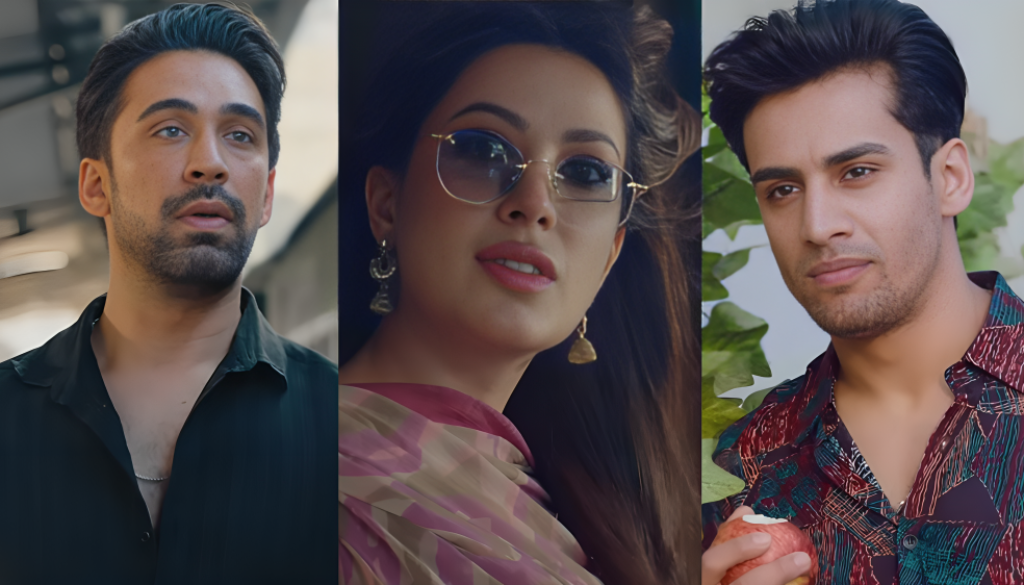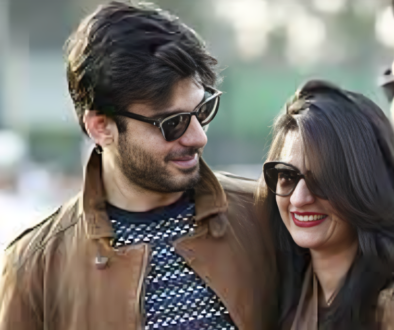Momin Saqib rescues ‘Daghabaaz Dil’ from falling flat
In the spirit of Eid entertainment, Wajahat Rauf’s “Daghabaaz Dil” brings together a blend of family drama and a touch of the supernatural. The film delves into the festivities, portraying the intricate dynamics of love within a Pakistani family. It centers around Zoya (Mehwish Hayat), the bride, who uncovers that her matrimonial destiny is intertwined with her cousin Faris (Ali Rehman), amidst the ongoing feud between their families.
While the premise of “Daghabaaz Dil” is intriguing, the film falls short of delivering the chaos promised by its premise. Co-written by Rauf and Mohsin Ali, the narrative remains somewhat restrained when it could have explored more imaginative avenues, particularly with the inclusion of a love-stricken jinn adding a fantastical twist.
As an Eid film, a genre to which Rauf has shown dedication in his previous ventures, the plot follows a formulaic masala formula. The typical mix of melodrama, romance, comedy, and action fails to blend seamlessly. Instead, the film unfolds with a multi-conflict storyline, characterized by half-baked events, one-dimensional characters, and emotions that serve more to propel the plot than to evoke genuine feeling.
Beo Rana Zafar portrays the grandmother with a simple desire for her family to share a loving bond, also acting as the mastermind behind romantic couplings. Babar Ali and Saleem Sheikh play the fathers of Faris and Zoya, respectively—two brothers whose greed for family property is surpassed only by their sister’s desire to see her daughter married to Faris.
The film “Phuppo aur unki Beti” relies heavily on the clichéd ‘conniving Phuppo and her daughter’ trope, but fails to use it effectively for comedic effect. Instead, it highlights the underlying misogyny inherent in this stereotype. Both characters are poorly written, to the extent that their names are forgettable, and their portrayal does little to engage the audience.
While a film’s politics may not always reflect its artistic merit, it’s important to consider how public perceptions of stereotypes around gender, race, caste, and creed are evolving, especially in Pakistani mainstream cinema. In this context, it’s intriguing to observe how Wajahat Rauf’s venture features a “girlboss” heroine whose past passion for cricket seems like mere superficial decoration. Unlike the conniving daughter of the Phuppo character, Zoya’s character is portrayed as having more depth and agency. She doesn’t simply want a man, let alone need one. However, there’s a subtle acknowledgment of traditional gender roles when she privately appreciates Faris defending her honor, despite having earlier rebuffed his chivalrous gestures with a reminder of her independence and autonomy.
In the showdown between Ken and Jinn, Mehwish’s character, reminiscent of Geet from “Jab We Met,” falls short in charm and originality. Her romantic interest in Faris seems inexplicable, while Ali Rehman’s portrayal of Faris lacks the charisma to make him a compelling hero. The real star of the show is the antihero, a jinn named Moon, played with verve by Momin Saqib. Moon injects energy into the film’s second half, driving the romantic entanglements between Faris, Zoya, and the conniving daughter of Phuppo.
However, the film’s portrayal of the supernatural is lacking in imagination, with the boundary between human and magical elements frequently blurred. Moon’s character, while entertaining, is primarily relegated to comic relief rather than being fully explored as a romantic foil.
On the technical side, “Daghabaaz Dil” delivers what is expected of a mainstream commercial film, but with some shortcomings. The sound mixing is subpar for a big-screen Eid release, and while the cinematography captures the vibrancy of a Pakistani wedding, some establishing shots feel redundant.
Overall, “Daghabaaz Dil” may entertain audiences looking for a fast-paced diversion, but it fails to break new ground in storytelling. Despite its faults, the film’s brisk pace and family drama elements may hold the attention of viewers, but it ultimately falls short of delivering a fresh cinematic experience.





